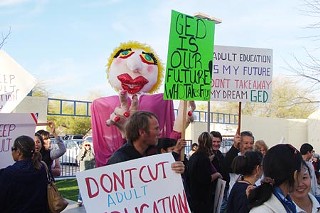Donna McLaughlin says it would be wrong to describe her efforts to go back to school and get her GED in her mid-40s as a "second chance."
"The last few weeks, I've heard a lot of people say, 'Everyone deserves a second chance.' The thing is, I've learned that for most of us, getting a GED isn't a second chance. It's a first chance," McLaughlin says.
Raped at 14, McLaughlin says, she became pregnant, gave the baby up for adoption and tried to go back to school, but her stepmother kept her home. At 16, she was kicked out of the house.
"I ended up staying with people I baby-sat for, but my brother was 14, and he ended up homeless. When you are in a situation like that, school is not on your mind. You have to get a job and feed yourself. I struggled for a few years, because I wasn't given the tools to survive that your parents usually give you. But I finally figured it out in my mid-20s," she says.
McLaughlin started a cleaning business that continues to thrive, but she was embarrassed when people asked her where she went to high school.
"Even though I had been successful, I still had doubts within myself, and I felt embarrassed. I'd lie to them. I didn't want people to know," she says.
McLaughlin is relieved that she got her GED right before these bad economic times began.
"If something happened to me physically, I wouldn't be able to do my job and would need to go back out into the job market," she says.
McLaughlin thinks Arizona legislators and Gov. Jan Brewer need to remember a key statistic as they consider cutting the $4.6 million for GED and adult education in the state budget: There are reportedly about 800,000 adults in Arizona who don't have a high school degree.
On Thursday, Feb. 4, McLaughlin joined about 200 people in the back courtyard at the El Rio Neighborhood Center on West Speedway Boulevard. Speakers at the rally, including Pima County Supervisor Richard Elías, reminded the crowd that 22,000 people in Arizona got their GEDs last year. Almost 20 percent of high school diplomas issued in Arizona last year were GED diplomas.
GED graduates earn $6,000 more a year than those without a diploma, Elías told the crowd, and that results in about $70 million in extra taxable income in Arizona.
The $4.6 million the governor wants to cut also comes with an $11 million federal match that will be lost with the cut, adult-education advocates say.
A week before the rally, McLaughlin and other GED recipients traveled to Phoenix to try to convince lawmakers that the elimination of adult-ed funding would be devastating.
"They all listened, but I don't think they were all too concerned about it," McLaughlin says.
McLaughlin and other advocates were troubled by comments attributed to District 26 Rep. Vic Williams. At the rally, Elías said Williams told adult-ed representatives that he received his GED, but he feels it's a "want, not a need," and it's not the state's responsibility to help fund GED programs.
Williams confirms that he did receive his GED when he was in his early 20s, but he denies ever saying that GED programs are a want, and not a need. Williams says he'd prefer to leave the funding in place, but as the Legislature looks at the governor's latest budget and considers additional cuts, it comes down to choices between K-12 funding, social services and adult education.
"If it finally comes down between one or the other, I'm going with K-12 and social services," he says.
He also says that it would be wise for adult-education groups to meet with lawmakers to work together on the best way to approach these possible cuts.
"I'd encourage them to work with us to try to mitigate the loss," Williams says. "The cuts have to happen. It's going to be painful, but it's going to be worse if we don't balance the budget."
McLaughlin says she wonders if legislators fully understand the possible results of their proposed cuts.
"If you can't get your GED, you're not going to be able to get into the (military) service, or get a job that requires a diploma. There's going to be more crime. If you think you're going to save money, think again. People will become homeless; there will be more people who need help with housing, food stamps and other assistance. Crime will go up," McLaughlin says.
"I understand that if people have never been hungry, they don't know. If they've never been homeless, they don't know. But I have. I guess it has to be close to their heart, or they don't care."
Literacy Volunteers of Tucson executive director Betty Stauffer says Brewer has noted that community organizations could fill the gap to provide adult-education services. Stauffer's mostly volunteer organization, however, would quickly be overwhelmed and unable to financially respond, she says.
"Where are community-based organizations going to get the resources to do that? If that happened, we'd need more staff. We probably could serve 4,000 students, but we don't have enough volunteers," Stauffer says.
Rather than going into GED testing and instruction, her organization has focused on working with people who lack basic literacy skills—skills people need before they step into an adult-education classroom. From there, many of the organization's students have gone on to get their GEDs—and statistics show that leads to more productive lives.
"What we know, from national studies for adult literacy, is that as a person's education level goes up, their incomes go up, and as their incomes go up, they pay more taxes and cost society less," Stauffer says.
Cuts to save $4.6 million is "a real false savings, because it is going to cost way, way more than that in the long run," Stauffer says.











